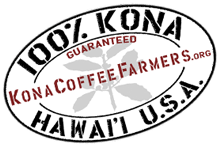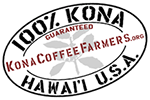President Bruce Corker to Colombia Coffee Federation
From: corkclan@msn.com
To: luisfernando.samper@cafedecolombia.com
CC: harold@hoogasian.com; josel.londono@cafedecolombia.com; senhee@capitol.hawaii.gov; repcoffman@capitol.hawaii.gov; sandra.kunimoto@hawaii.gov; john.m.ryan@hawaii.gov; gomesgomes@yahoo.com; pgee@starbulletin.com
Subject: RE: Kona Coffee Farmers Association
Date: Thu, 10 Dec 2009 22:09:37 -1000
Dear Luis Fernando:
The Kona Coffee Farmers Association very much appreciates the work of you, Mr. Londono, and the Colombian Coffee Federation to respond with such detailed and thorough answers to our questions. We will carefully review and consider these answers, and we thank you for the offer to discuss follow up questions we may have. By copy of this email we are sending this information to the Hawaii Department of Agriculture for its review and consideration as well. Your responses will be invaluable in the efforts of Hawaii coffee growers to build a system of protections for the names of our regional coffees similar to the excellent system Colombia already has in place.
Thank you for alerting us to the launch of the Federation’s new version of its website. We plan to review of the new format and topics as soon as available.
We look forward to working and exchanging ideas and information with you in the future on labeling, trademark and geographic issues.
With best wishes y aloha,
Bruce Corker
Kona Coffee Farmers Association
Subject: RE: Kona Coffee Farmers Association
To: corkclan@msn.com
CC: harold@hoogasian.com; josel.londono@cafedecolombia.com; senhee@capitol.hawaii.gov
From: LuisFernando.Samper@cafedecolombia.com
Date: Thu, 10 Dec 2009 09:32:44 -0500
Dear Bruce:
Following you will find our replies to your questions. Of course, if you need us to expand on any of the items mentioned, we would be happy to do so.
Corker--1–In general terms, how does the Colombian Coffee Federation go about determining whether unfair marketing practices or counterfeiting of Colombian Coffee is occurring in the United States? Does the Federation actively monitor marketing practices? Do reports come in from vendors or others in the US about such practices? How are reports investigated and verified?
By Different means: i) We do monitor marketing practices through with different servixces like Datamonitor, and even google alerts and other new product launcvhes; ii) we do receive reports from brokers, roasters, consumers, etc. iii) We have quaility control agreements with different labs, and obtain random samples of coffee described as Colombian, so that we narrow down potential infringement issues; iv) Through our Intellectual Property in-house dept. we receive trademark applications and usage reports from especialized companies that provide such services as well as from their all around the world attorneys.v) We have developed a system of purchase reporting through an extranet, which is associated with a code of conduct voluntary agreement to make sure all green Colombian coffee sales are accounted for and we know who is responsible from then on.
Most cases we face also deal with trasdemark applications that include the word Colombian or Colombian coffee on them. We are requires to oppose them -although the USPTO should have rejected them beforehand. In other questions we expand what we do when we detect probable infringement cases.
Corker–2—When the Federation becomes aware of counterfeiting in the United States (that is, use of the Colombian Coffee name on packages which contain less than 100% Colombia-grown coffee) what steps are taken? Letters from the Federation? Cease and desist letters from Federation lawyers? Court actions? In the US Courts? In other jurisdictions?
Normally we prefer to send kind but firm C&D letters (which often consist of an explanation of the rights infringed, a request to cease and desist, and an invitation to sell 100% Colombian Coffee). Bear in mind that we do not tolerate descriptors such as Colombian blend or Colombian type, which for us constitute an infringement.
However, if the “infringer” does not reply or disregards our demands, our attorneys send a second letter in order to comply with preliminary legal actions requirments, which are filed or sought before the US Courts (normally in New York, which is very expensive and would make most infringers think about keeping up with legal costs), if the infrigment takes place in the US. If it takes place in a different jurisdiction we seek for the corresponding court.
Corker–3–When legal action is taken, what are the common legal theories relied upon? Trademark? Unfair competition? Consumer protection? Other? Are there US court decisions protecting the interests of the Federation? Are those decisions helpful in obtaining early agreements to cease and desist from other violators?
Given that in the United States only applies the trademark theory, and that the Certification mark tools are part of the Trademark system, we use this instrument as our biggest tool to bring to courts.We know that Trademarks are also part of the Unfair Competition Law, which is also necesarly linked to Consumer rights. However, we have not reached the point where the above criterion has been declared or ruled by a Court, since: a) we normally reach settelement agreements with infringers; or, b) the ruling or decisions we have obtained have been issued by the Trademark trial and Appeal Board of the USPTO, which often limits their decision to whether or not there is a likelihood of confusion within the applied for mark and the certification mark.
Also, we have been advised that for mislabeling cases we would need to talk to the FDA. However they pay little attention and priority to coffee mislabeling as they consider that it does not constitute a serious health risk.
Corker--4–What sorts of methods of proof does the Federation use to prove counterfeiting? Business records? Scientific analysis? Witness testimonies? Other?
The production, distribution chain is useful to determine that the infringer might not bought enough amount of Colombian Coffee to offer it as 100% Colombian. However, the best proof is the Scientific Analysis, showing that the coffee offered contains different origins. This is whay we have invested a lot in technology (expert cup´pers are regarded by judges as biased and or subjective opinions, and the counterpart always brings its own cupper). We work with three different technologies to demonstrate non Colombian content -(this is an area whwere we could cooperate analyszing Hawaian coffees and contrasting them to different origins).
Corker–5—Does the Federation file complaints with federal or state authorities? Pursue civil actions with private US attorneys?
In principle we prefer federal courts initiating actions through our US attorneys.
Corker-6—It is our understanding that “Colombian Coffee Blends” (that is, coffee consisting of some Colombian coffee mixed with non-Colombian coffee) is not authorized by the Federation—and that such blends are not lawfully sold in the US. Is our understanding correct? If so, are enforcement procedures followed by the Federation similar to those used with respect to counterfeit coffee.
Same procedures. However, we usually end up providing some time to the copunterpart to finish his packaging.
Corker–7—Does the Federation use contractual protections–that is, as a condition of sale of Colombian coffee, are buyers required to agree not to “blend” Colombian and other coffees? To make records available for inspection if counterfeiting or related issues arise?
We do not object the use of Colombian coffee as part of blends, what we do object to is using the Colombian coffee reputation to be able to sell that blend at a higher price. We also have a long standing (more than 40 years) program called the 100% Colombian Coffee Program, by means of which we signed Trademark License Agreements with Coffee Roasters, which obligations are also undertaken by their private labels, being one of those obligations, but the main one, using our logo and/or the expression Colombian in connection with 100% Colombian Coffee only. Similarly, our code of conduct agreements say that the word Colombian or any confusingly similar term that intends to convey the Colombian origin is not allowed aunless the coffee consists of 100% Colombian origin.
Corker–8—We are interested in the legal status in Colombia of the Colombian Coffee Federation? It is our understanding that for Colombian Coffee the Federation performs many functions similar to that performed by the Hawaii Department of Agriculture. To what extent is that understanding correct?
The Colombian Coffee Growers Federation (FNC for short) history is quite long and has evolved in time (you may want to check www.federaciondecafeteros.org). While we do not know the Hawaii Department of Agriculture structure and activities very welll, we could tell you that the FNC is like a huge Coop/trade association and a non for profit entity, representing over 500,000 Colombian Coffee Growers.
We have agreed since the early 1940s with the Colombian government a joint decision making for coffee policy, and have been assigned to perform many functions including R&D and agricultutral support-extension, as well as quality control.
Corker–9—Coffee Farmers in Kona are very concerned about both counterfeiting and deceptive “blending” practices—particularly those occurring on the US Mainland. We would be very interested in any thoughts or observations related to these concerns which you believe may be useful to us.
We certainly share your concern. Our most problematic areas in the US are the NY area and the South east, although we see other problems from time to time. We believe to be able to have solid cases we need strong origin verification technologies – something we are working with – and also more education to customers and the public in general as to what a certification mark of origin means and how serious an offense it is to infringe it. We believe that agricultural products are unfairly treated in the US system since they can not access the distinctive prioduct status that winesl and spirits have, providing them with stronger instruments to defend themselves, This discrimination is the essence of the GI debate within Doha where OriGIn, as you know, is defending that position. We believe that there is a lot of work to be done with state agricultural officials as to what are the “strategic options” for highly differentiated agricultural products. This applies for products sold in domestic markets that also have a export possibilities -such as yours – where one clearly does not want to compete on a cost basis but on differentiation and reputation (to be able to compete in export markets with undifferentiated products, the only option for many countries is subsidies….). This merits a debate within State Ag officials to convince Federal officals that the GI debate is a serious thing and not just a dairy industry topic.
Lastly, we will be launching in a couple of weeks our new version of the www.cafedecolombia.com site where many of this topics may be further explained. Hope this helps for the time being.
Best,
Luis Fernando Samper
Director General Propiedad Intelectual – Director Intellectual Property
Federación Nacional de Cafeteros de Colombia – Colombian Coffee Federation
Calle 73 No. 8-13 Torre 8 Piso B
PBX: +(57-1)-313-6600 Ext. 731
Direct :+ (57-1-) 313-6631 Fax: +(57-1) 217-3736
Bogotá – Colombia – SA
mailto:LuisFernando.Samper@cafedecolombia.com
www.federaciondecafeteros.org
www.juanvaldez.com
www.cafedecolombia.com
Nota: La información transmitida a través de este correo electrónico es confidencial y está dirigida únicamente a su destinatario. Su reproducción, lectura o uso está prohibido a cualquier persona o entidad diferente. FEDERACAFE y ALMACAFE no se hacen responsables por la eventual transmisión de virus o programas dañinos por este conducto, y por lo tanto es responsabilidad del destinatario confirmar la existencia de este tipo de elementos al momento de recibirlo y abrirlo. Ni FEDERACAFE y ALMACAFE ni ninguna de sus divisiones o dependencias aceptan responsabilidad alguna por eventuales daños o alteraciones derivados de la recepción o uso del presente mensaje. Las opiniones, conclusiones y otra información contenida en este correo no relacionadas con el negocio oficial de FEDERACAFE y ALMACAFE, deben entenderse como personales y de ninguna manera son avaladas por la Compañía.

